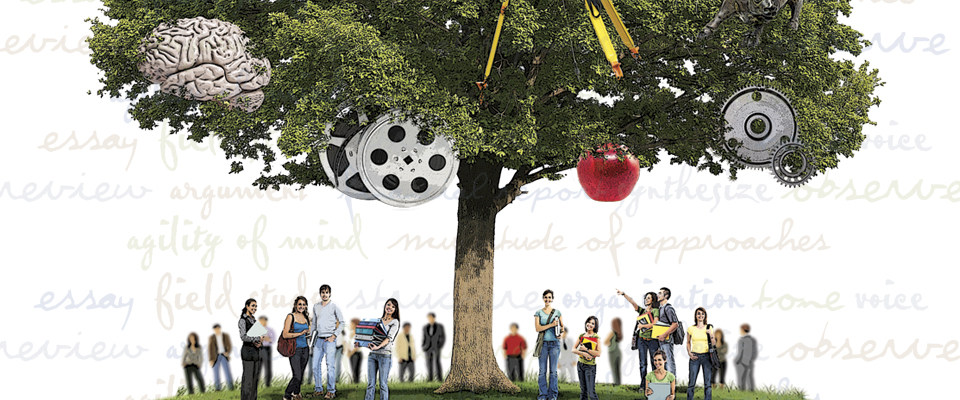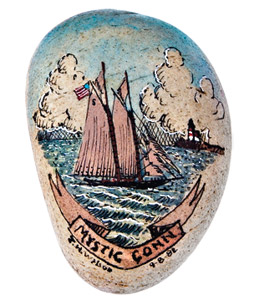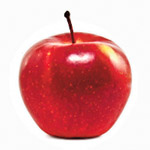Nov 8, 2013
STEM Support
A gift from Ken Tator ’63 and his wife, Maureen, in support of writing in science, technology, engineering, and mathematics (STEM), funded a workshop…

by Kathleen Parrish | illustration by Terry Stout
Students in a geology class write detailed field reports assessing a site’s potential for petroleum and mineral production. Engineering studies majors craft business memos to clients both fictional and real in a capstone course, and students in economics write detailed financial reports about existing companies. Writing is not just being taught in English courses, but infused throughout the curriculum in dynamic ways by faculty in every field, ensuring that students learn how writing practices such as sentence structure, organization, voice, tone, and citation style vary from one academic discipline to another.
 “Whenever students sit down to write after they leave here they will always be writing according to certain kinds of conventions,” says Bianca Falbo, associate professor of English and director of the College Writing Program. “Each discipline has specific rules governing what can and cannot be said, and how it is said.”
“Whenever students sit down to write after they leave here they will always be writing according to certain kinds of conventions,” says Bianca Falbo, associate professor of English and director of the College Writing Program. “Each discipline has specific rules governing what can and cannot be said, and how it is said.”
This semester, the College offered 78 writing-designated courses in 14 departments giving students a multitude of options for meeting the requirements of the new Common Course of Study that went into effect last year. In order to graduate, students must take four writing courses, including two upper-level ones, one in and one outside their major. These courses are defined by the use of process-writing methods, and they require students to produce a total of at least 20 double-spaced pages or 5,000 words throughout the semester.
 Process writing refers to practices used by all good writers—planning and revising, rearranging and deleting text, re-reading, obtaining a review by a colleague, and producing multiple drafts before reaching a finished document. In an academic setting, it means that professors do more than assign a topic and receive a finished paper; they intervene in the writing and re-writing process itself.
Process writing refers to practices used by all good writers—planning and revising, rearranging and deleting text, re-reading, obtaining a review by a colleague, and producing multiple drafts before reaching a finished document. In an academic setting, it means that professors do more than assign a topic and receive a finished paper; they intervene in the writing and re-writing process itself.
Offerings with the “W” designation range from Advanced Neuroscience, Engineering and Society, Reading Visual Media, and Comparative Psychology of Animal Behavior to Philosophies of Religion, American Fiction, and Political Sociology. Through this multidisciplinary approach, students learn a range of writing styles used by professionals in particular fields. They learn from professor-mentors who know the techniques best. In addition, they develop the agility of mind to recognize which style to employ to suit a particular purpose.

Students in the Literature of the Sea course visit Mystic Seaport in Connecticut as a laboratory in observation. They learn how to use their writing as a way to mingle the experience of being in that setting with literary analysis of related works.
“Faculty in their disciplines are the best teachers of writing for that discipline,” says Patricia Donahue, professor and chair of English. She started the College Writing Program in 1987 as a collaborative effort between English and what at the time was the economics and business department.
“Writing should not be and is not solely the job of the English department,” she adds.
The College has practiced that philosophy since at least 1892 when Francis A. March, a member of the faculty from 1855 to 1906 and first professor of the English language and literature in the United States, wrote: “It is desired that students in each department shall write on subjects connected with it in the words and phrases current among experts. In these matters, the professors in each department are authorities.”
Consider, for example, Advanced Developmental Psychology, a 300-level course taught by Lauren Myers, assistant professor of psychology. Students are required to write two lab reports employing the American Psychological Association style guide. “It’s the standard for how psychologists write,” she says. The discipline has a specified style and structure for an article’s organization and content.
“They’re writing to solidify information and in doing so, they’re also finding their voice.”
—LISA GABEL
In Physiological Psychology, Lisa Gabel, associate professor of psychology and chair of neuroscience, requires students to write an opinion paper on an ethical implication of animal research and another that incorporates the perspectives of scientists, veterinarians, and an individual outside of the field. “They’re writing to solidify, to synthesize the information,” she says, “and in doing so, they’re also finding their voice—one of the most difficult things to do. It’s not only writing to learn, it’s writing to find their particular style and become comfortable with the nomenclature.”
That can take time, Gabel says, which is why she doesn’t impose a page count on assignments.
 “Science writing is logical, straightforward, and succinct,” she explains. “I don’t like to put restrictions on paper length because the students are not perfect writers; they’re still learning how to convey complex information. As they continue to write, they’ll improve over time. I worry less about the number of pages and more about the end result.”
“Science writing is logical, straightforward, and succinct,” she explains. “I don’t like to put restrictions on paper length because the students are not perfect writers; they’re still learning how to convey complex information. As they continue to write, they’ll improve over time. I worry less about the number of pages and more about the end result.”
Students in Gabel’s Psychopharmacology class write research grants for a new drug they’re developing. In other classes, they produce PowerPoint presentations, posters, research reports, and portfolios. “I can’t think of a discipline where writing is not important.”
What about math? Is writing really a necessary component in courses such as Calculus, Statistics, or Linear Algebra?
“Writing is about pulling together deduction, observation, and identification of patterns in a way that invites readers to have the same experience.”
—ROB ROOT
It is if you want other people to understand your work, says Rob Root, professor of mathematics, who teaches Mathematics of Social Justice, a course that explores the equitable distribution of benefits and burdens in an increasingly global society.
“Math is different from other disciplines in that writing comes along after the creative stroke” of finding a solution to a problem, he says. “Words convey understanding to colleagues” and can explain the process of “deduction, observation, identifying patterns, and pulling it all together in a way that invites readers to have the same experience.”
 Writing forces mathematicians to think more carefully about their work, says Root, referencing Pierre de Fermat, a 17th-century mathematician whose Last Theorem included partial results and false steps in the 350 years between its statement and its proof. Andrew Wiles, who finally proved the result, discovered a flaw when he started to write up his proof. Correcting it delayed publication but resulted in a proof believed to be complete.
Writing forces mathematicians to think more carefully about their work, says Root, referencing Pierre de Fermat, a 17th-century mathematician whose Last Theorem included partial results and false steps in the 350 years between its statement and its proof. Andrew Wiles, who finally proved the result, discovered a flaw when he started to write up his proof. Correcting it delayed publication but resulted in a proof believed to be complete.
Engineering is another discipline that students mistakenly think doesn’t require an aptitude for writing, says Benjamin Cohen, assistant professor of engineering studies and a historian. “It’s one of the top professions in terms of how much writing is required,” he says, noting engineering studies graduates need to be able to communicate not only with other engineers but also stakeholders within their profession who may or may not have a technical background. “They need to cull evidence and make arguments in a way that non-engineers can understand.”
Students often ask if that means writing something so “their mother will understand,” a characterization Cohen reframes by saying, “First of all, your mom is pretty smart, and you’re speaking to a population of educated professionals, but they might not have the same training in technology and engineering that you do. It’s not about ‘dumbing down.’ It’s about understanding how to characterize a difficult problem in an accessible manner.”
 Rijan Maharjan ’14 says when he first came to Lafayette from Nepal four years ago he wasn’t comfortable writing in English, his third language, and didn’t understand why becoming a proficient writer was necessary as a mechanical engineering major.
Rijan Maharjan ’14 says when he first came to Lafayette from Nepal four years ago he wasn’t comfortable writing in English, his third language, and didn’t understand why becoming a proficient writer was necessary as a mechanical engineering major.
“I thought, ‘Why do I need to know this?’ ”
But then he took an English course with Christian Tatu, coordinator of the College Writing Program, and the value became apparent. “I need to be able to explain to people why what I do matters,” says Maharjan, who is a writing associate or WA, offering one-on-one tutoring to other students in a variety of majors. “If I can’t do that there is literally no point to my work. Let’s say I’m in a meeting with potential funders. They’re not all engineers. They probably don’t care about the nuts and bolts. I need to tell them this is what we’re doing, why it matters, and where it’s going.”
Each semester between 50 and 60 WAs work with about 750 students. Each WA is paired with a professor and a specific course that in many cases is outside the WA’s discipline.
 Shehtaz Huq ’14, an English major and film and media studies minor, says working with students in computer science, religious studies, and philosophy courses made her a better WA and improved her own writing because it forced her to consider different ways of approaching an issue.
Shehtaz Huq ’14, an English major and film and media studies minor, says working with students in computer science, religious studies, and philosophy courses made her a better WA and improved her own writing because it forced her to consider different ways of approaching an issue.
That’s the idea behind Edible Ethics, a course taught by Megan Rothenberger ’02, assistant professor of biology, that requires students to post thoughts about articles they’ve read on coffee cooperatives, farm subsidies, veganism, and other food topics onto a class website for purposes of communicating issues to a general audience. Students also produce and upload videos and design graphics and maps to accompany text.
Rothenberger also teaches Conservation Biology, a science that advocates for the protection of species, habitats, and ecosystems. Interdisciplinary by nature, the field involves communicating research and recommendations to a variety of stakeholders including policymakers, park managers, and the general public. “They need to be able to understand what we’re doing so they can apply that knowledge and hopefully find a solution,” she says. Communicating scientific issues to a general audience is sometimes a challenge for biology majors because they have been taught to be objective and to reference technical details. “It’s hard for them to turn off their science-writing brain.”

Teaching students how to write in ways dictated by different academic disciplines has a long tradition, dating back to at least 1892 when Francis A. March, the first professor of English language and literature in the United States, described the approach.
Surprisingly, communicating about literature to a wide audience can be equally challenging. Students have to analyze and interpret texts and relate those interpretations as evidence-based arguments, says Chris Phillips, assistant professor of English, who takes students majoring in a range of subjects to Mystic Seaport in Connecticut for his Literature of the Sea course.
Students write essays about the experience in connection with literary analysis and post them on a class website so they can read each other’s work and comment. Students also live-tweet during class, which has yielded surprising results and even inspired Twitter users from outside the College to join the discussion.
Composing coherent thoughts using the tweet limitation of 140 characters forces students to learn the art of brevity and how to choose words carefully to communicate what they mean. They learn the importance of reading or observing carefully so that they can recall and use what has been absorbed in their writing.
 Those skills of observation and brevity coupled with the ability to record and then analyze gathered data are all called into play in the course Earth Surface Processes. Students write reports containing the same content as those produced by geologists at consulting firms. Dru Germanoski, Van Artsdalen Professor of Geology, explains that the reports must include details about climate, location of a drainage basin, structure of rocks, and how the soil relates to the geology, among other information. “The writing has to be well-organized, concise, and direct, not passive or containing subordinate clauses and leading sentences,” he says. Reports also contain charts and graphs as well as aerial photos with detailed, specific captions.
Those skills of observation and brevity coupled with the ability to record and then analyze gathered data are all called into play in the course Earth Surface Processes. Students write reports containing the same content as those produced by geologists at consulting firms. Dru Germanoski, Van Artsdalen Professor of Geology, explains that the reports must include details about climate, location of a drainage basin, structure of rocks, and how the soil relates to the geology, among other information. “The writing has to be well-organized, concise, and direct, not passive or containing subordinate clauses and leading sentences,” he says. Reports also contain charts and graphs as well as aerial photos with detailed, specific captions.
Business writing is another discipline that usually follows a prescribed set of conventions, although the approach taken by Rose Marie Bukics, Jones Professor of Economics, is anything but rote. In Financial Theory and Analysis, students compare and contrast existing companies in financial reports for a fictional boss. The Wall Street Journal is required reading and a launching pad for weekly writing assignments. “To me writing isn’t just about writing, it’s about analyzing information and then presenting the results of your analysis,” says Bukics, whose book Reading, Writing, and Thriving: How to Make The Wall Street Journal a Key Part of Your Business Curriculum won the American Educational Publishers Association’s Distinguished Achievement Award.
“There are different audiences, and you have to learn to customize your writing to reach them.”
—ROSE MARIE BUKICS
“The challenge for students is getting them to think about writing from a multitude of approaches that are dictated by the different disciplines, and sometimes they get frustrated,” she says. “They say, ‘When I was in English class they told me to write this way,’ and I say, ‘Well, there are different audiences, and you have to learn to customize your writing to reach them.’ It’s a fabulous way to educate them; not just to think differently about issues, but to think differently about how best to present information.”